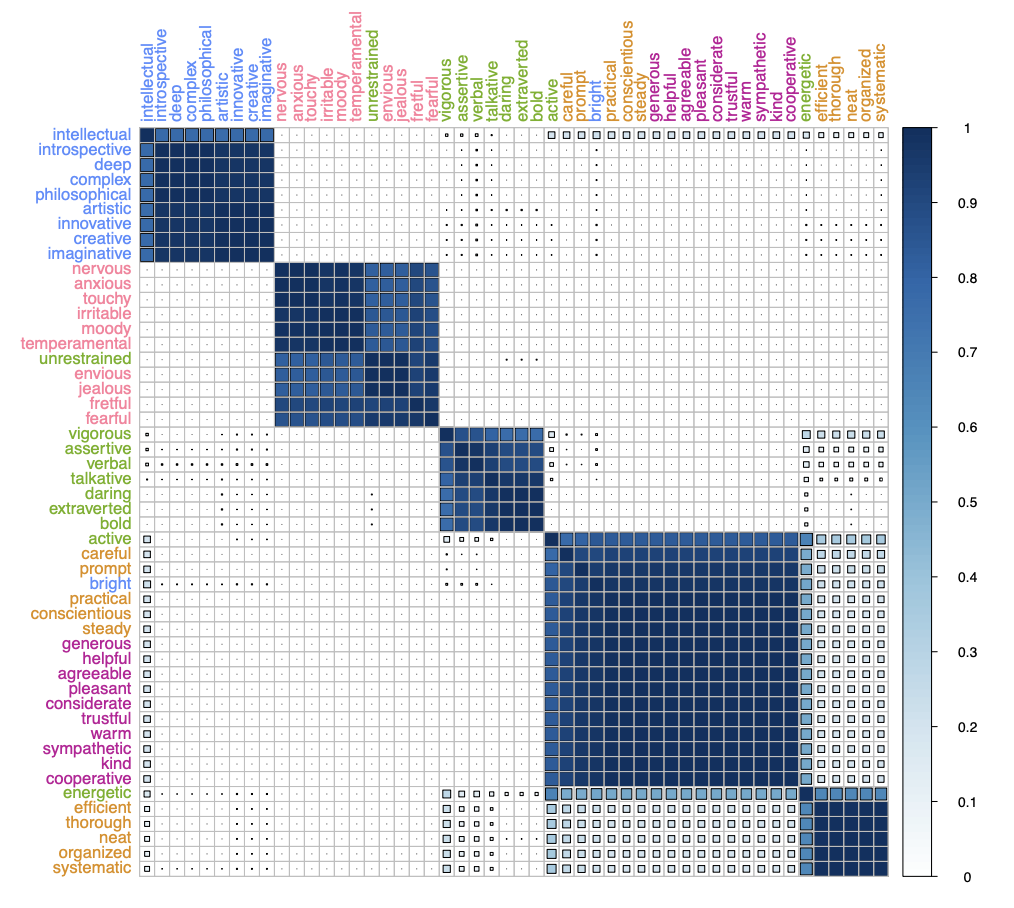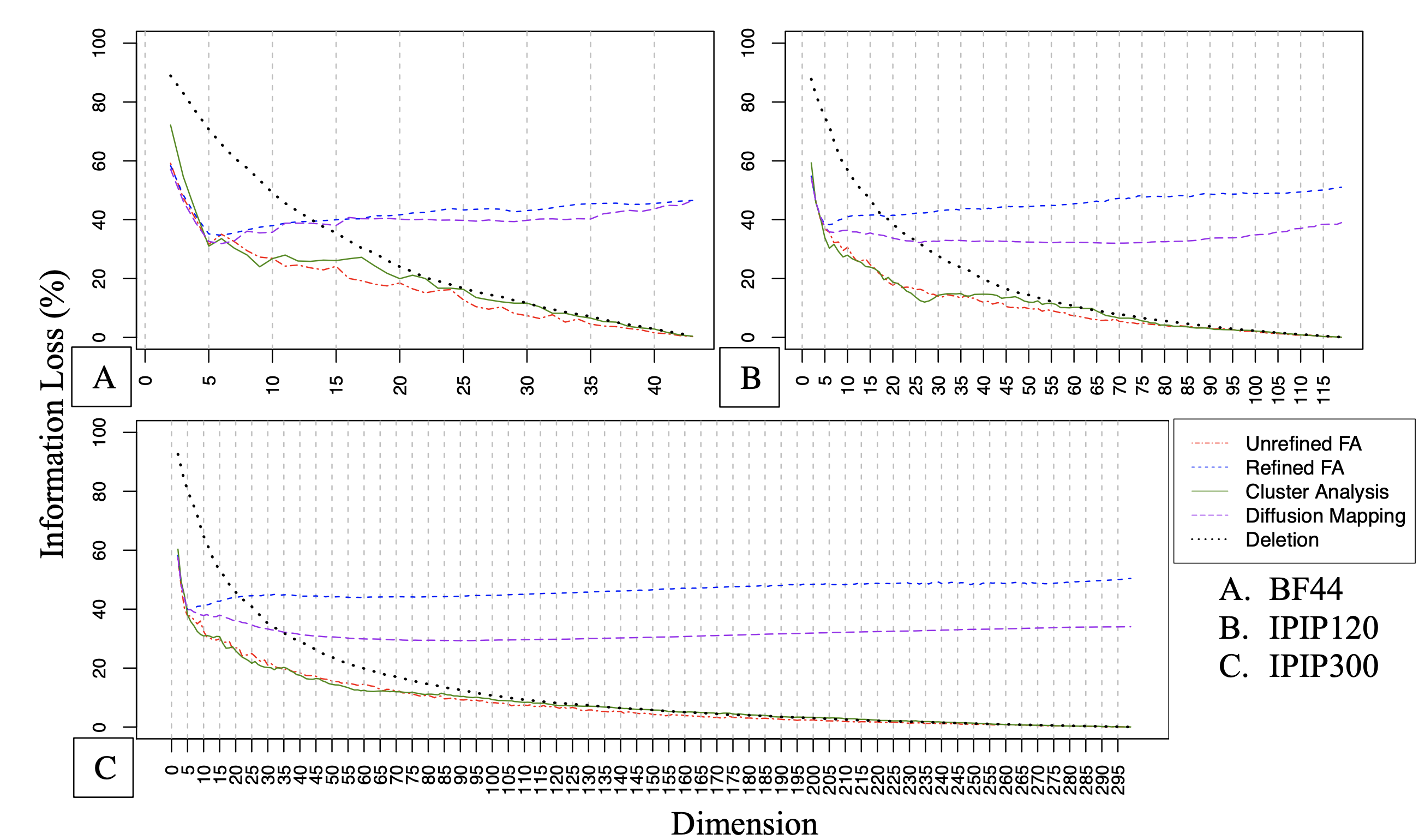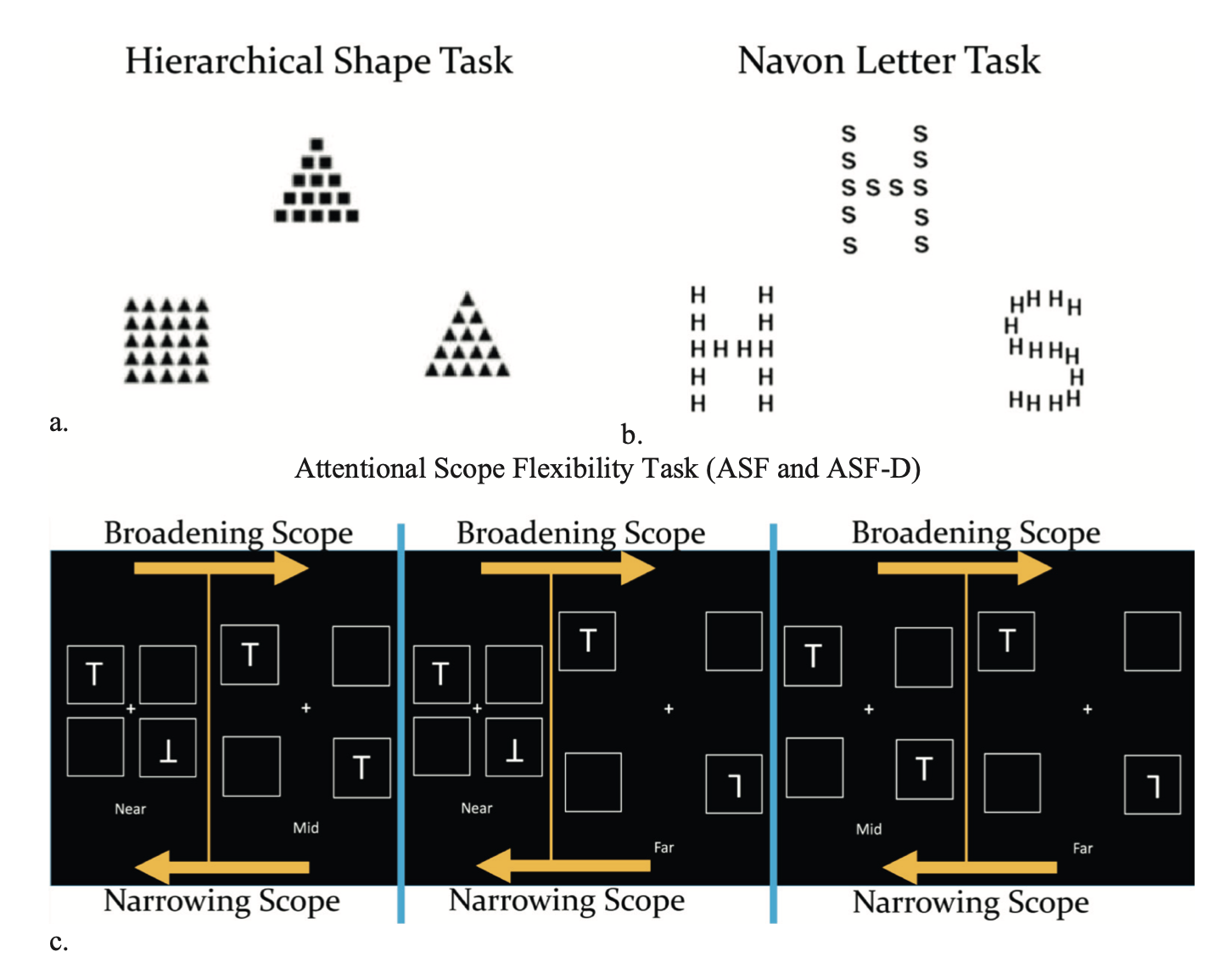
 |
 |
 |
Since 2013, I have completed more than 25 different research projects. I describe my most recent and exciting projects in the recaps below. If you have any questions regarding these studies or would be interested in collaborating, please do not hesitate to contact me.

Word Embedding (WE) represents a class of machine learning techniques used to model the relative meaning of words. While WE has been validated as a means to recover the meanings contained in text, this tool has not been validated as a means to recover the meanings contained in our heads. Thus, in three studies, I considered the degree to which WE recover the conceptual organization of semantic memory. I found that when WE models are preprocessed, these computational models of language can recover ~95% of the structure of semantic memory. Moreover, I found that these computational models of language inherently contain psychological models of personality and emotion that are typically derived from self-report studies. Together, these results demonstrate how computational models of language can be used to probe the human mind at a scale and depth unattainable by conventional research methods. The totality of this project is described in my PhD dissertation. An early version (preprint) of this work can be found here.

Statistical methods such as Dimension Reduction (DR) are commonly used to derive psychological models. It is therefore imperative that we understand how these statistical methods influence our models. To answer this question, I considered the performance of DR on several Big Data personality surveys. I found that information loss following DR is substantial, with different methods resulting in different types of information loss. Moreover, I established a set of reliable information loss curves that depict the impact of DR at different levels of resolution. Accordingly, I utilized these curves to put forth a series of guidelines to help psychologists minimize information loss in different contexts. You can read about this project in full here.

Modern personality theorists posit that people can be distinguished on the basis of five personality traits. The degree to which a person expresses each of these five personality traits represents their unique personality profile. Whether or not there are a fixed number of personality profiles remains to be seen. To answer this question, I cluster analyzed the personality profiles of over a million participants to determine whether there are consistent profile types. I found that the expression of a given personality trait restricts the possible expression of other traits, resulting in a total of 25 to 50 types of personality profiles. Together, these results explain why personality theorists since Hippocrates have been able to reduce the immense diversity of individual differences to a fixed set of personality types. Please contact me if you would like a copy of this research.

Within the time that it takes to blink, humans are able to accurately infer the personality traits of others from portraits. While this finding implies that facial features convey personality traits, the precise cues that communicate personality remain unknown. To answer this question, I magnified the motion of facial expressions using a video processing algorithm and tested whether such magnifications impacted personality judgments. I found that certain traits – specifically extraversion – were more accurately identified when micro facial expressions were exaggerated. These results suggest that unconscious facial reactions reveal dimensions of our personality to others. Please contact me if you would like a copy of this research.

Personality traits are predominantly assessed using self-report questionnaires – which are subject to conscious and unconscious response biases. In an effort to move away from self-report, I tested whether personality traits can be assessed using attention-based measures. I found that trait Conscientiousness and trait Openness can be reliably inferred from performance on attentional scope tasks. These results demonstrate that personality measurement, or at lease response validation, may be possible using task-based measures. I published this research here.

Although performance feedback is widely employed as a means to improve motivation, the efficacy and reliability of performance feedback is often obscured by individual differences and situational variables. The joint role of these moderating variables remains unknown. Accordingly, I investigated how the motivational impact of feedback is moderated by personality and task-difficulty. I found that Conscientious and Neurotic individuals together appear particularly sensitive to task difficulty, becoming significantly more motivated by negative feedback on playful tasks and demotivated by negative feedback on frustrating tasks. Together, these results demonstrate importance of considering personality traits when providing performance feedback. I published this research here.
I have presented my research at a number of conferences and labs over the years:
Word Embeddings as a Psychological Research Tool. Centre for Social Cognitive Studies. Krakow, Poland. (March 3, 2020)
Mapping the Collective Mind: Semantic Networks Derived from the World Wide Web. Society for Personality and Social Psychology Conference 2020. New Orleans, USA. (February 27, 2020)
Uncovering the Semantic Basis of the Big Five Using Word Embedding. The Canadian Psychological Association’s Annual Convention. Halifax, Canada. (May 31, 2019)
A Novel Method for Inferring Psychological Characteristics from Language Use. Data Natives. London, England. (March 1, 2019)
Elaborating Traits Using Network based Descriptions. Society for Personality and Social Psychology Pre-Conference for Personality Psychology 2019. Portland, USA. (February 7, 2019)
Conceptualizing Cute vs. Hot Personalities: The Colder You Are, The Hotter You Get. International Congress of Applied Psychology. Montreal, Canada. (June 26, 2018)
Therapy on Social Media: Who Talks About Trauma? Trauma and Nightmare: International Interdisciplinary Conference. Gdansk, Poland. (March 1, 2018)
Uncovering the Conditions for the Frame of Reference Effect in Personality Measurement. The Canadian Psychological Association's 78th Annual Convention. Toronto, Canada. (June 8, 2017)
Zoning in and out: Attentional Differences Associated with Big Five Personality Traits. Society for Personality and Social Psychology Conference 2017. San Antonio, USA. (January 21, 2017)
Conscientious Effort: For Shame or for Praise? The Canadian Psychological Association's 77th Annual Convention. Victoria, Canada. (June 10, 2016)
Gender Differences on Tedious vs. Playful Tasks Following Negative and Positive Feedback. International Scientific Conference on Gender Differences. Rzeszow, Poland. (May 18, 2016)
Conservative Rigidity: Exploring the Roles of Perspective Taking and Perspective Shifting. The Society for Personality and Social Psychology Pre-Conference for Political Psychology 2016. San Diego, USA. (January 19, 2016)
Tapping into group opinions: Individual differences that predict consensus sensitivity. The British Psychological Society Developmental and Social Section Conference 2015. Manchester, England. (September 9, 2015)
Developing a Narrative Based Objective Measure of Conscientiousness. The Canadian Psychological Association's 76th Annual Convention. Ottawa, Canada. (June 6, 2015)
Master Minds: Jordan Peterson & John Vervaeke Discuss the Meaning of Life (Debate Moderator). Toronto, Canada. (February 5, 2015)
The Narrative of Mental Health. University of Toronto’s Annual Psychology Department MA Poster Day. Toronto, Canada (January 26, 2015)
The Narrative of Mental Health. The 2nd WPA-INA-HSRPS International Psychiatric Congress. Athens, Greece. (October 30, 2014)
Bringing Insight into the Classroom. The International Conference on Education and Educational Psychology 2014. Kyrenia, Cyprus. (October 22, 2014)
Refining Conceptions of Perception by Crossing the Gap between Religion and Science. Toward a Science of Consciousness Conference 2014. Tucson, USA. (April 23, 2014)
The Narrative of Mental Health: How the Types of Stories We Tell May Shape Our Emotions. Social/Personality Research Group Meeting. Toronto, Canada. (November 19, 2013)
Conceptualizing Perception in Psychology and Buddhism. Mini Mind Matters III Conference. Toronto, Canada. (May 4, 2013)